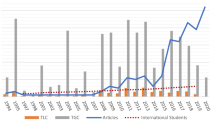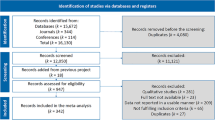Abstract
We analyse social interactions during the first days of class in a secondary mathematics classroom (15 and 16-year-olds) with a high percentage of immigrant students. Our analyses show the co-existence of different models for both the interpretation and the use of classroom social norms and socio-mathematical norms. Valorising some behaviours over others appears as part of the discursive practices of mathematics classrooms. Local and immigrant students are not expected to behave in the same way, nor are they treated in the same way. The teacher and some students, who are familiar with the prevailing norms, cancel certain norms for a while in such a way that some immigrant students are excluded from fully participating in the mathematical discussion.
Similar content being viewed by others
References
Abreu, G. (2002). Towards a cultural psychology perspective on transitions between contexts of mathematical practices. In G. Abreu, A. Bishop & N. Presmeg (Eds.),Transitions between contexts of mathematical practices (pp. 173–192). Dordrecht, The Netherlands: Kluwer.
Abreu, G., & Cline, T. (2003). Schooled mathematics and cultural knowledge.Pedagogy, Culture and Society, 11, 11–30.
Boaler, J. (2002). Exploring the nature of mathematical activity: Using theory, research and ‘working hypotheses’ to broaden conceptions of mathematics knowing.Educational Studies in Mathematics, 51, 3–21.
Civil, M., & Planas, N. (2004). Participation in the mathematics classroom: Does every student have a voice?For the Learning of Mathematics, 24 (1), 7–12.
Cobb, P., & Yackel, E. (1998). A constructivist perspective on the culture of the mathematics classroom. In F. Seeger, Y. Voigt & U. Waschescio (Eds.),The culture of the mathematics classroom (pp. 158–190). Cambridge: Cambridge University Press.
Confrey, J. (2000). Leveraging constructivism to apply to systemic reform.Nordic Studies in Mathematics Education, 8 (3), 7–30.
Cook-Gumperz, J. (1986).Social constructions of literacy. New York: Cambridge University Press.
Coulthard, D. (Ed.) (1992).Advances in spoken discourse analysis. London: Routledge.
Dowling, P. (1998).The sociology of mathematics education. London: Falmer.
Forman, E. A., & Ansell, E. (2001). The multiple voices of a mathematics classroom community.Educational Studies in Mathematics, 46 (1/3), 115–142.
Forman, E. A., & McCormick, D. E. (1995). Discourse analysis, a sociocultural perspective.Remedial and Special Education, 16(3), 150–158.
Gee, J. P. (1999).An introduction to discourse analysis: Theory and method. London: Routledge.
Gorgorió, N., & Planas, N. (in press). Social representations as mediators of mathematics learning in multi-ethnic classrooms.European Journal of Psychology of Education.
Khisty, L., & Chval, K. (2002). Pedagogic discourse and equity in mathematics: When teachers’ talk matters.Mathematics Education Research Journal, 14 (3), 154–168.
Klein, M. (2002). Teaching mathematics in/for new times: A poststructuralist analysis of the productive quality of the pedagogic process.Educational Studies in Mathematics, 50(1), 63–78.
Lerman, S. (2000). The social turn in mathematics education research. In J. Boaler (Ed.),Multiple perspectives on mathematics teaching and learning (pp. 19–44). Westport, CT: Ablex.
Lerman, S. (2001). Accounting for accounts of learning mathematics: Reading the ZPD in videos and transcripts. In D. Clarke (Ed.),Perspectives on practice and meaning in mathematics and science classrooms (pp. 53–74). Dordrecht, The Netherlands: Kluwer.
Mehan, H. (1979).Learning lessons: Social organization in the classroom. Harvard: Harvard University Press.
Mehan, H. (1992). Understanding inequality in schools: The contribution of interpretive studies.Sociology of Education, 65, 1–20.
Mehan, H., & Wood, H. (1975).The reality of ethnomethodology. New York: Wiley InterScience.
Moll, L. (1992). Bilingual classroom studies and community analysis: Some recent trends.Educational Researcher, 21 (2), 20–24.
Morgan, C., & Watson, A. (2002). The interpretative nature of teachers’ assessment of students’ mathematics: Issues of equity.Journal for Research in Mathematics Education, 33 (2), 78–110.
Nkhoma, P. (2002). What successful black South African students consider as factors of their success.Educational Studies in Mathematics, 50 (1), 103–113.
Planas, N. (2001).Obstacles en l’aprenentatge matemàtic: La diversitat d’interpretacions de la norma. Unpublished doctoral thesis. Barcelona: Universitat Autònoma de Barcelona. Accessed April 25, 2004 from: http://www.tdcat.cbuc.es/TDCat-1116101-145701/index.html
Planas, N. (2004). Metodología para analizar la interacción entre lo social, lo cultural y lo afectivo en educación matemática.Enseñanza de las Ciencias, 22 (1), 19–36.
Planas, N., & Civil, M. (2002). Understanding interruptions in the mathematics classroom: Implications for equity.Mathematics Education Research Journal, 14(3), 169–189.
Potter, J. (1996).Representing reality: Discourse, rhetoric and social construction. London: Sage.
Skovsmose, O. (2000). Aphorism and critical mathematics education.For the Learning of Mathematics, 20 (1), 2–8.
Pomerantz, A., & Fehr, B, J (1997). Conversation analysis: An approach to the study of social action as a sense making practices. In T. A. van Dijk (Ed.),Discourse as social interaction (pp. 64–91). London: Sage.
Walkerdine, V. (1998).Counting girls out: Girls & mathematics (studies in mathematics education). London: Routledge Falmer.
Wood, L., & Kroger, R. (2000).Doing discourse analysis: Methods for studying action in talk and text. London: Sage.
Yackel, E., & Cobb, P. (1996). Sociomathematical norms, argumentation, and autonomy in mathematics.Journal for Research in Mathematics Education, 27 (4), 458–477.
Zevenbergen, R. (1996). Constructivism as a liberal bourgeois discourse.Educational Studies in Mathematics, 31, 95–113.
Zevenbergen, R. (2003). Ability grouping in mathematics classrooms: a Bourdieuian analysis.For the Learning of Mathematics, 23 (3), 5–10.
Author information
Authors and Affiliations
Rights and permissions
About this article
Cite this article
Planas, N., Gorgorió, N. Are different students expected to learn norms differently in the mathematics classroom?. Math Ed Res J 16, 19–40 (2004). https://doi.org/10.1007/BF03217389
Issue Date:
DOI: https://doi.org/10.1007/BF03217389




